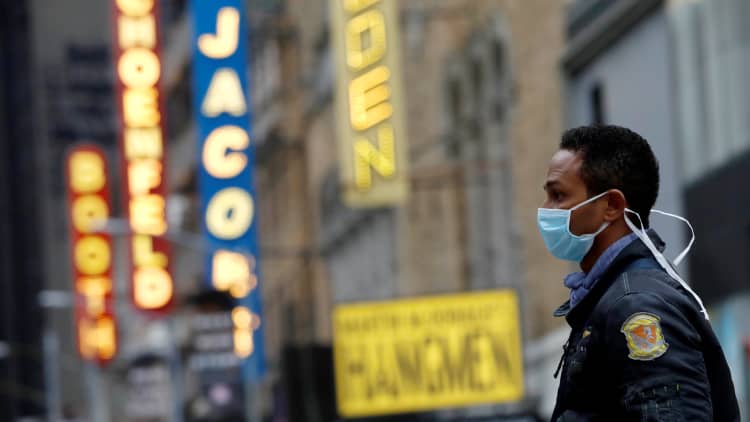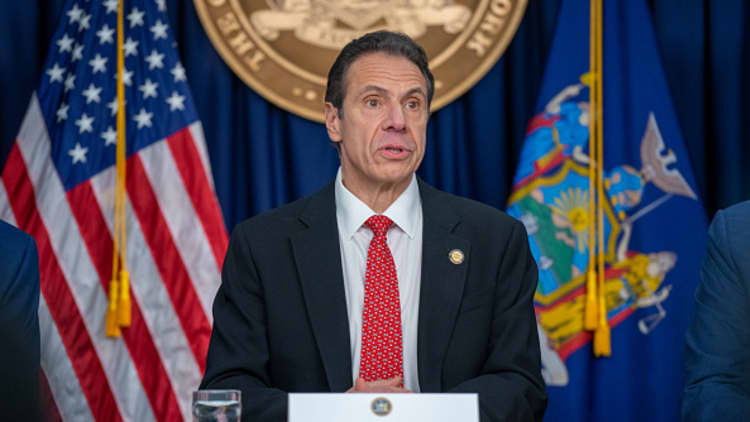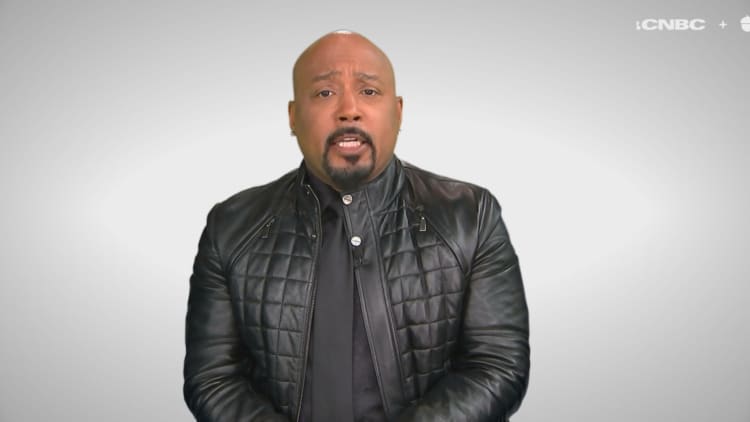
Gov. Andrew Cuomo on Friday ordered nonessential businesses to keep 100% of their workforce at home, and he put in place stringent new restrictions on New Yorkers starting Sunday as the state grapples with the worst coronavirus outbreak in the U.S.
"When I talk about the most drastic action we can take, this is the most drastic action we can take," Cuomo said at a press conference in Albany. Cases across the state surged by 2,950 overnight to 7,102, he said. "This is not life as usual. Accept it. Realize it and deal with it."
Cuomo acknowledged that the restrictions will force businesses to close and people to lose their jobs, adding that he's suspending evictions across the state for 90 days.
"We're all in quarantine now. We're all in various levels of quarantine and it's hard," he said.
New York Mayor Bill de Blasio has been pushing Cuomo to issue a shelter-in-place order for New York City, where cases skyrocketed by more than 1,000 in a matter of hours on Thursday. More than half of the state's cases are concentrated within the five boroughs. De Blasio, later Friday, said the city has become the new epicenter for the outbreak in the nation with 5,151 confirmed infections, about a third of all U.S. cases.
New Jersey Gov. Phil Murphy announced later Friday that he also plans to shut down nonessential businesses, adding that he expects to issue an executive order on Saturday. "If you are not need as part of our response efforts, stay home and practice social distancing," he said.
Illinois Gov. Jay Pritzker also announced later Friday a statewide "stay-at-home" order. The measure takes effect on Saturday at 5 p.m. and will last until April 7, he said, adding that people will still be able to leave their homes to buy groceries, go running and for other purposes.
"To avoid the loss of potentially tens of thousands of lives, we must enact an immediate stay-at-home order for the state of Illinois," he said at a news briefing. "For the vast majority of you already taking precautions, your lives will not change very much."
Cuomo didn't call the new restrictions a "shelter-in-place" order, although many of them mirror what's in place elsewhere in the country where officials have put such an order in place.
"It is not a shelter-in-place order," Cuomo said, adding that he doesn't want to scare residents. "Shelter in place is used currently for an active shooter or a school shooter."
When in public, individuals must practice social distancing of at least 6 feet, he said. Businesses that provide essential services, like grocery stores, pharmacies, banks and food delivery, must implement rules that ensure employees and customers maintain at least 6 feet of space between each other, according to a slide presented at the press conference. Individuals should also limit use of public transit only if it's absolutely necessary. Individuals will also need to limit outdoor activities, avoiding ones where they come into close contact with other people.
"Outdoor recreation is a solitary recreational exercise. It's running. It's hiking," Cuomo said. "It's not playing basketball with five other people."
Sick people shouldn't leave their home unless they need to go to the doctor or hospital, he said. Young people should also practice social distancing and avoid contact with vulnerable populations, he said.
"These provisions will be enforced. These are not helpful hints. This is not if you really want to be a great citizen. These are legal provisions," Cuomo said, adding that businesses will be fined for noncompliance but individuals won't be sanctioned.
Cuomo put out a call to businesses to start making masks, gloves and other medical gear. The state is scrambling to increase its hospital capacity to meet an onslaught of COVID-19 cases expected over the next 45 days, he said.
De Blasio said Thursday there's been "an explosion of cases here in New York City," including an inmate at Rikers Island. Cases in the city jumped by 1,939 overnight to 4,408, Cuomo said Friday. The number of cases is surging as the state ramps up its testing capability and detects previously unknown infections. "This number is, nonetheless, very, very painful," de Blasio said Thursday when the case count was significantly lower.

On Tuesday, de Blasio told New Yorkers to prepare for a "shelter-in-place" order in the coming days to contain the fast-moving virus. Cuomo resisted, saying Wednesday that he wouldn't approve one, worried it will cause people to panic, thinking officials were going to shut down the bridges and tunnels.
De Blasio said he wants to model the city's restrictions after ones adopted by Northern California officials earlier this week. San Francisco Bay Area officials ordered some 7 million residents to "shelter in place" on Monday, prohibiting people from leaving their homes, except under "limited circumstances," according to the order.
People in the Bay Area who venture out are expected to remain 6 feet apart, wash their hands, cover their coughs or sneezes and abide by a number of other restrictions. Nonessential businesses across the state, including wineries and bars, will be closed. But essential services such as grocery stores, banks, pharmacies and cannabis shops will remain open.
Residents are allowed to walk their dogs or go for a run, so long as they maintain a distance of at least 6 feet from anyone they don't currently live with, San Francisco health officer Dr. Grant Colfax said at a press conference Monday.
— CNBC's Emma Newburger contributed to this report




